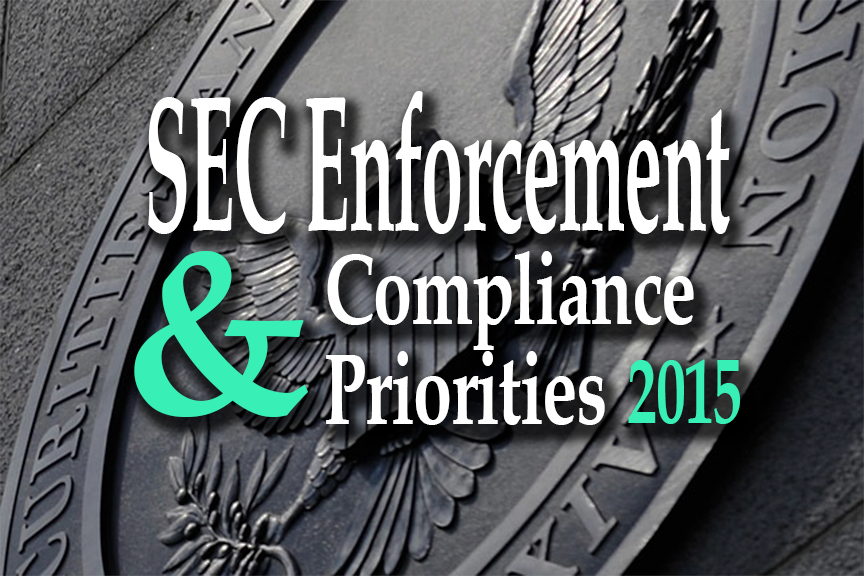Trends in SEC Enforcement
In April 2013, the new Chair of the SEC, Mary Jo White, took the reins at the agency. Once sworn in, Chair White, a former U.S. Attorney, promised renewed vigor by the Enforcement Division and the use of increasingly tough prosecutorial tactics. These tactics included a departure from the “no admit, no deny” policy historically espoused by the SEC and an increased willingness by the agency to take cases to trial in federal court or administrative proceedings.
Now, over a year into Chair White’s tenure, the SEC staff seems to be putting her policy of “no broken windows” into practice. In particular, the SEC has sharpened its focus on investment advisors and hedge funds and has continued its investigations into and pursuit of alleged accounting misconduct, violations of the Foreign Corrupt Practices Act (FCPA) and insider trading. With the allure of multimillion-dollar awards available through the SEC’s whistleblower bounty program—which offers whistleblowers who provide original information that leads to a successful enforcement action between 10 and 30 percent of the SEC’s total recovery—compliance and legal personnel must remain vigilant in ensuring that appropriate controls and policies are in place to prevent misconduct and encourage internal reporting of misconduct.
Hedge Funds and Private Equity
The SEC’s enforcement priorities recently expanded to include hedge funds that, prior to the Dodd-Frank Wall Street Reform and Consumer Protection Act (Dodd-Frank), were not registered with the agency. Although the agency typically has focused on public asset managers such as mutual funds, it now has expanded regulatory authority to review private equity and hedge funds. Dodd-Frank requires most midsize and large private equity and hedge funds to register with the SEC.
Ensuring transparency in these funds is a top SEC priority. As a result of these new registrants, the SEC has created an initiative to examine these funds through “presence exams.” The SEC examiners will look at areas including how private equity and hedge funds value their assets, disclose their fees and communicate with investors. These presence exams, which are shorter in duration and more streamlined than typical examinations, are designed both to engage with newly registered hedge funds and other private fund advisors and to permit the SEC examination staff to examine a higher percentage of new registrants. In fiscal year 2013, the SEC only examined approximately nine percent of registered investment fund advisors.
According to Chair White, the goal of the examinations is not to play “gotcha.” It is instead to make sure newly registered private fund advisers are aware of their obligations under the SEC’s rules and to promote investor-oriented business practices through the sharing of best practices. Chair White emphasized that the SEC staff is pursuing five focus areas for the presence exams:
- Marketing
- Portfolio Management
- Conflicts of Interest
- Safety of Client Assets and
- Valuation
Compliance personnel of newly registered hedge funds and private equity funds should be aware of the SEC priorities in presence exams and carefully consider the possible ramifications of potential issues found in presence exams, given the agency’s intense prosecutorial stance under Chair White.
Financial and Accounting Fraud
In July 2013, the SEC announced the creation of a Financial Reporting and Audit Task Force. Chair White emphasized the significance of this initiative as part of the SEC’s goal of covering the whole market. The Task Force’s principle goals are fraud detection and increased prosecution of violations involving false or misleading financial statements and disclosures, with a focus on identifying and exploring areas susceptible to fraudulent financial reporting. The agency plans to accomplish the Task Force’s goals with the assistance and use of technology-based tools.
The Task Force addresses a number of issues, including use of reserves, revenue recognition, audit committees and the role of auditors (with particular attention paid to independence issues). The Task Force also has been developing new ways to identify accounting fraud through leading-edge technology such as the new Accounting Quality Model (known informally as “RoboCop”). In addition, the Task Force solicits whistleblowers in order to learn about misconduct that would otherwise be difficult or impossible to detect. Unlike similar initiatives in the past to assist the Division of Corporation Finance in advising clients during the comment letter process, the purpose of the Financial Reporting and Audit Task Force is enforcement rather than prevention. There is significant concern that this effort is not about helping companies spot errors, but instead seizing upon corporate accounting missteps.
In light of these developments, compliance personnel, audit committees and internal audit should consider reviewing their company’s accounting policies, practices and personnel to reduce the risk that the SEC will scrutinize the company’s accounting. In particular, companies should consider taking the following measures:
- Audit: Vet complex accounting issues—particularly those involving significant revenue—with outside auditors and direct internal auditors to review the application of GAAP to the company’s accounting policies and practices. This will help ensure that significant accounting judgments are well documented.
- Training and Policies: Periodically train accounting personnel. Reiterate an institutional commitment to ethical conduct related to accounting. Ensure the independence of controller functions from business functions, and review compensation policies for financial personnel to de-link compensation from accounting judgments.
- Hotline: Install and publicize the availability of a hotline and other tools to allow confidential reporting of suspected wrongdoing to senior management and other key governance bodies.
- Prompt Investigations: Promptly investigate any suspicions of wrongdoing or inaccurate accounting.
FCPA Investigations
The SEC is continuing its pursuit of violators of the FCPA. Kara Brockmeyer, Chief of the Foreign Corrupt Practices Unit of the Enforcement Division, has made clear that no industry, region or country is immune from FCPA or corruption issues. Ms. Brockmeyer also has stated that the agency may start bringing FCPA cases in administrative proceedings. Prior to the enactment of Dodd-Frank, penalties in administrative cease-and-desist proceedings could be levied only against regulated entities such as broker-dealers or investment advisors. Now, under section 929P of Dodd-Frank, the SEC has the authority to seek a civil monetary penalty in an administrative proceeding against any individual or company.
FCPA cases typically have not been brought in administrative proceedings because of the limitations on the forum to handle large, complex cases involving vast amounts of data. For example, discovery is significantly limited in an administrative proceeding. The SEC is required to provide only its investigative file. In addition, the timing in administrative proceedings is much shorter, leaving the defense less time to prepare and respond.
The potential of having FCPA cases brought in administrative proceedings is troubling to the defense bar for reasons beyond the limited discovery and tight time constraints. Administrative proceedings are heard by an administrative law judge (ALJ) employed by the SEC. There is no right to a trial by jury in an administrative proceeding. Moreover, although a challenge to an ALJ decision is heard de novo, the appeal is made to the SEC Commission, which initially authorized the action.
Compliance personnel should act quickly when suspecting any potential violation of the FCPA, given that the SEC may opt for an administrative proceeding, which would limit drastically the time and tools available to the company.
Insider Trading
Insider trading remains a priority of the SEC, and there is no indication that the SEC’s interest in insider trading has waned in the slightest. The agency is now shifting gears in its surveillance of insider trading, and it is using data analytics to assist in the surveillance. Historically, the SEC has focused on issuers and individual securities when performing surveillance. Recently, Daniel Hawke, Chief of the Market Abuse Unit in the Division of Enforcement, stated that the agency has shifted its surveillance method to a trader-based approach, focusing on patterns of trading and relationships among traders that may yield evidence of insider trading. The agency is relying upon technology to analyze trading patterns through analyses of blue sheets. This type of analysis allows the SEC to search over the prior 20 to 30 years of trading in order to find patterns and relationships that could be indicative of insider trading.
In a recent insider trading enforcement action, the agency took an aggressive stance toward information regarding an activist hedge fund’s plans by considering them a corporate secret. In a case against an individual, the SEC alleged that the roommate of an analyst tipped off a neighbor about his employer’s plan to announce a negative view of a public company. The neighbor then purchased put options of the public company one day prior to the announcement. The SEC alleges that the employer’s plans for attacking the public company were material nonpublic information, and that there was the “duty of confidence” between the roommate and the junior analyst that was breached. The duty of confidence exists whenever a person agrees to maintain information in confidence and whenever individuals have a history, pattern or practice of sharing confidences. As this case indicates, the SEC is not stepping back regarding insider trading claims, instead continuing to aggressively pursue insider trading using novel and untested theories.
Whistleblower Bounty Program Awards
In addition to the renewed prosecutorial vigor by the Enforcement Division, the existence of the SEC whistleblower bounty program is changing the corporate compliance landscape and requiring companies to work harder to ensure internal reporting. On September 22, 2014, the SEC announced an award of at least $30 million to a whistleblower residing overseas.1 The award is more than double the Commission’s previous record award of $14.7 million in October 2013. In addition, it is nearly twice the $16.75 million total awarded to all whistleblowers, cumulatively, since the program began in 2011. The award will be the fourth given to a whistleblower in a foreign country since the program’s inception. This award is a game changer and likely will be the tip of the iceberg for awards to come.
The SEC likely will continue to receive record numbers of tips, potentially leading to additional enforcement actions. As more and larger awards are announced, the threat of a whistleblower reporting outside a company’s internal reporting structure is likely to increase. The incentive to report directly to the SEC rather than internally should force companies to evaluate the effectiveness of compliance and internal reporting systems.
Conclusion
The uptick in SEC enforcement actions likely will not wane anytime soon. Rather, with Chair White’s aggressive prosecutorial goals driving the agency, the SEC is more hard-charging than ever in its investigations and enforcement actions. Given this landscape, compliance and legal personnel should work diligently to establish and maintain robust compliance policies, internal controls and internal reporting programs.
1 For more information on this award and the whistleblower bounty program, please visit http://www.cadwalader.com/resources/newsletters/sec-enforcement-advisor/sec-announces-largest-ever-whistleblower-award-awards-30-million-to-foreign-whistleblower










